Justin Meldal-Johnsen on Music Production Philosophies and the Meaning of Musical Success
In an industry that measures success by album sales and critical acclaim, it’s refreshing to hear from someone who refuses to subscribe to such a narrow definition.
“I think some people are putting the idea of success too high on a pedestal and are twisting what success actually means,” Justin Meldal-Johnsen tells me on the phone while taking a break from working on Paramore’s upcoming record in Nashville.
The Los Angeles-based producer and bassist makes it clear throughout our conversation that he’s more interested in having a connection with an artist than cashing in a big paycheck.
“Producing is hard work, so it has to be a pleasant process, and it has to be about people for me,” he adds.
It’s no shock then that, over the years, JMJ has collaborated with a slew of fascinating artists: Beck, M83, Paramore, Nine Inch Nails, Tegan and Sara, Garbage, and Air are just a few of the many acts he’s accompanied, whether on tour or in the studio. Still, he remains humble and very conscious of his expanding role as an in-demand record producer/engineer.
“My job,” he says, “is to figure out a way to capture somebody in a moment in a way that they feel is representative and something they’ll want to listen to.”
Taking a hiatus from touring with his longtime collaborator and friend, Beck, JMJ has sessions lined up for the rest of the year. Despite his busy schedule, he was kind enough to share his thoughts on production, success, and music critics with SonicScoop.
So, you’ve been in Nashville for a few weeks now, making a new record with Paramore. I was recently listening to the latest self-titled release they did with you. I feel like they made some tremendous growth on that album. I think a lot of that can probably be attributed to working with you.
Well, I don’t know about that. The band just came up with songs that weren’t typical Paramore songs. That gave me a pathway. I don’t think that I was coming in there and taking what they did and completely repurposing it. I was hearing a new set of inspirations and a new set of purposes and from there I was doing everything I could to give it a sound that I felt was right for it.
I think that the material that they came to me with dictated the process very clearly. It wasn’t really a thing where I had to put them in different clothes—they already were there. It wasn’t a walk in the park—it was a lot of work—but it never felt like I was scratching my head wondering what to do.
Well, that’s good. Yesterday, I read something you said on Twitter that I thought was relevant to that idea: “Sometimes an artist’s new music is not meant to be a continuum from previous work.” I like that a lot. As a producer, do you think your job is to allow that to happen?
Oh yeah, big time. I don’t think there is any other part of my job. My job is to figure out a way to capture somebody in a moment in a way that they feel is representative and something they’d want to listen to.
Even though I make music that is pop music—some more pop than others—I’m only ever making records that are guided by the idea of making something that is interesting to the artist. I don’t really know how to do things like make singles and stuff like that. If that happens, it’s really a happy accident.
Artists these days have more latitude to be more different from the average album than they used to be. There’s a little bit less prejudice towards people changing their style. There’s more freedom in that regard.
I want to work with people that are coming to me with a sense of strong purpose and identity that they want to achieve on the record. If they don’t have that, or if there’s something about it that smells a little bit complacent, I tend to stay pretty far away from that.
That makes sense. One of the things that I admire about how I’ve heard you work is that you like to incorporate the band in the process a lot. How do you go about that?
I think that everybody is a producer, essentially. I don’t feel that my skill set or my job description has anything to do with being in an ivory tower, or is something that I need to “protect” in any way.
On more than one occasion, an album will start out with me as the producer and I will—without the artist even asking for it—share the production credit [with the artist], because during the process, I empower the artist to feel like they have a lot more knowledge and control over the details of production than they even thought they had in the first place. That’s become a goal of mine.
I guess it’s part of me being a musician first, and wanting people to feel that if they get their hands really dirty, it may interest them more while the record is going down. The record then ends up being a little more personal.
Given the choice, do you prefer to just be overseeing and producing or to be a part of the actual writing process?
I don’t care. I just want it to be good. At the end of the day, I’d like to be able to put the record on and like it. Whatever way it gets there is just circumstantial.
Anything that has to happen in order for the result to be that we can put it on and be like “this is music we want to listen to ourselves”, and there’s not any point of compromise, then I’m happy.
So if it involves me needing to step in and contribute to some writing it’s totally fine. I like doing that. I come up with ideas fast and enjoy helping, but in L.A. there’s this sort of “alpha”, very competitive spirit of getting and securing writing credits. It’s like buying real estate or collecting baseball cards or something. It has, in its roots, a feeling of financial attainment behind it. That just doesn’t interest me.
I don’t care about money. I don’t care about how everything gets split up. I want a fair picture of what the work was, but I don’t seek out that stuff, nor do I go into a project saying, “Okay, so here’s the deal: I get X number of points, a year’s advance, and I’m going to need 15% minimum of this many songs.” Frankly, I know producers that have formulas like that.
Producing is hard work, so it has to be a pleasant process and it has to be about people for me. I’d rather make something that is worth doing and that I actually believe in first. Everything else can just go to hell. I don’t have a lot of interest in playing the game of being competitive or sucking up songwriting credit.
Right. Spending time concentrating solely on that seems so wasteful.
It can be, but for a lot of guys it’s not. Some people are very aggressive about their careers, banging out projects with a lot of speed, and getting as much [as they can] done per year. There are people that came up around the same time I did that have houses in Hawaii now. That’s great; good for them. They’re probably a lot more effective at their job than I am.
I don’t do this for that. I do this because I like to get in a room full of people and get excited about a mission. The other thing that is part of my makeup is that I won’t work with people I don’t like, personally. I just won’t. I will sabotage the project or my involvement in the project very early before I would do that.
I’m not very career-driven. That may work to my detriment, but that’s the way it has to be for me.
Your priorities seem purely creative and artistic. I think that’s what most people should strive to attain.
I guess. It works for me. I’m just trying to have a good time with people that I enjoy being around. Other than that, if we can make something great together, then that would be really cool.
Success is not measured for me by numbers, or any kind of financial reward. It’s measured by the relationships that I get.
When M83’s Hurry Up, We’re Dreaming came out, it did so well in every way. Did that have any effect on how you and the band approached their latest record, Junk?
Each album is an island unto itself. I don’t really feel the need to reference a certain mode of work or have any concern about a level of success. It’s more about what the artist is feeling right now and what I need to help them with.
I’ve seen you post online a lot about The Smiths and New Order. How have those bands influenced you?
I’m a music omnivore, so you’re looking at a small slice of my musical taste, but with New Order, for me, it’s all about the purity of being able to do what they imagined without interference from the outside. That’s the biggest steal.
In studios across the world, there is a lot of lip service given to the idea of doing things with integrity and doing things that are authentic. Over the last 10 years, “authentic” has imbedded itself into the lexicon in a very annoying way—it’s used all too easily. I find myself being very critical of people who call their music authentic, especially these days, so I choose not to go down that negative path in what I do.
I’m just trying to find the people that really are authentic to me. Sometimes, I like to go down a rabbit hole of opening up the eyes of people who may be willing to listen to what I have to say and talk about something that is meaningful to me and that I actually truly think is authentic. It’s something that came from the spirit of punk and DIY and was done on the terms of zero compromise and zero interference from the outside. That’s a pretty lost format for a band because it’s very difficult to make a living in music these days.
New Order coming out of the ashes of Joy Division is a very rare circumstance, but it’s something that is exceedingly romantic to me. There are parallels there to M83 and there are parallels to what I said on Twitter about the artist’s work not necessarily being a direct line from their previous work because if you look at the new M83 album, which received mixed reviews in the press, it’s one of the finest modern examples of a state of extreme isolation, and freedom from the expectations, and influence of the music industry. I think it’s brilliant because it’s a complete musical universe unto itself.
To me, whether it’s critically received or not, I could hardly give a shit about, because it’s perfect. I’m not saying it’s a perfect album, but it’s perfect in its mission because it achieved exactly what it was supposed to achieve.
Ironically, it’s just one of those albums that seems to be getting more and more love from people who are reaching out to me all the time going, “I can’t believe you made that album, you and Anthony.”
It’s almost naïve in the way it unfolds, the lay of its sonic landscape, and the songs it’s made up of. That was the way it was done and it’s a high bar for me to make records like that but that’s what I want to do from here on out. I want to do things that are just pure where they don’t have A&R machinations behind them and there’s no agenda that’s based in fear.
Are critics too quick to review albums they might not really understand?
I think first impressions are quite valuable, so I don’t fault any critic for saying, for instance, that they find the new M83 album to be a head-scratcher. But, on the other hand, it got five stars in Q and other magazines. Some reviews are off the charts and some reviews are a mess.
For an album like that to be out there at all gives me a perverse joy. It’s so unapologetically selfish and isolated from anything trendy that it’s hard for people to sometimes get into that. Maybe also they just don’t like the tunes, so I don’t really care what critics say. They can have a whole gambit of opinions about it. That record was made just for me and Anthony. It wasn’t made for anyone else. It wasn’t made to be the music of the summer or to be full of festival bangers. It just doesn’t have any of those agendas in it. There’s nothing like that. It was made in complete isolation.
[A]n album like that, and probably a couple of the other albums I’ve made that have a similar spirit may surprise people in terms of how they reach into the future. I think there’s a good chance that an album like that is running a very, very long race and may be something people flip out on 10 years from now.
The same thing happened with Beck when we made Midnite Vultures. It’s an album that was created in a very selfish way. It was done for our amusement and pleasure and not anyone else’s. There was no record company around—we were doing it to please ourselves and we loved it. Then it came out and, in terms of Beck, it had a bit of a modest success. Over the last 15 years, it has become iconic and people want to talk to me about it all the time. Every week I run into someone and all they want to talk about is Midnite Vultures. That’s the kind of album that I care about.
Do you remember the first thing you worked on where you thought to yourself “I’m really proud of this”?
Yeah, absolutely. I was in a band a long time ago called Medicine. It was a noise pop band in the early ‘90s.
Not too many people know about it because there was not much success around Medicine at all, but it was a West Coast answer to My Bloody Valentine. It was super noisy guitars and really rough recording techniques with really sweet vocal harmonies. It was a little Beach Boys-inflected, California-inflected music in a way.
When I joined that band in 1995, it was pretty exciting. It was an album I made with them that I felt like, “Wow, this is cool.” I felt like I was doing something important. It was just the pleasure of using the studio as a tool and having a good time. It was cool.
Yeah, even if you’re not making much money at first, just being in the studio is pretty amazing.
I still make music for no money! Over the past two years, I’ve done two albums—one by The Raveonettes and one by School of Seven Bells—in which there was no money.
They’re just small projects and I can’t be Mr. “Big-Time-Producer” and ask for a big advance or anything.
Those are projects that I do because I love them. I always have to do those. If I don’t, I feel like I’m slowly dying.
What is something that you wish more musicians, producers, and engineers would do that they’re not currently doing?
I think some people are putting the idea of success too high on a pedestal and are twisting what success actually means. I would like to see people become less formulaic and more free with what they’re doing, and maybe staying off social media a little bit more.
I’d like to see people spend more time on the song, rather than on all of the methods used to record it and the details of how it sounds. For me, [music that is] out right now and is somewhat popular seems to be dating itself very quickly. I wish people would step back and not worry too much and be more song-oriented. That would be cool.
It cheapens everything when everyone is using the same sample library or the same DAW or the same recording methodology and the same ultra-loud premastering faux mastering/mixing thing. It’s fatiguing. I want to see people making records in the way that they used to be made, which is to say less obsessive about being competitive and trendy.
Let’s just honor great songwriting. My roots are strictly first wave punk rock, new wave, and post-punk, so I come from a land where records didn’t really have anything to do with how they were made, and they had everything to do with the power of the artist behind them.
- Justin Meldal-Johnsen’s live bass rig from his tours with Beck.
- A view of Meldal-Johnsen’s studio.
- Stompboxes galore at JMJ’s own studio.
- Noisemakers and tonebenders.
- Going modular
- A piece of Justin Meldal-Johnsen’s synth collection.
- More synth love.
- Racks of gear at JMJ’s studio.
- In the studio with Hayley Williams of Paramore.
Please note: When you buy products through links on this page, we may earn an affiliate commission.













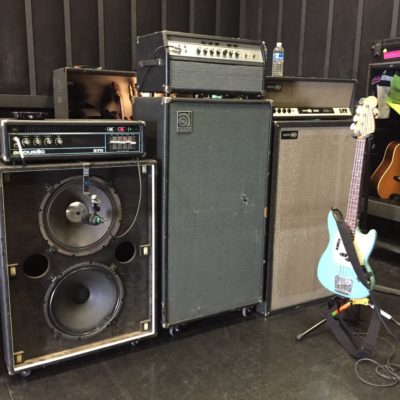

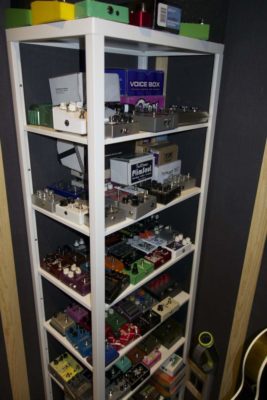

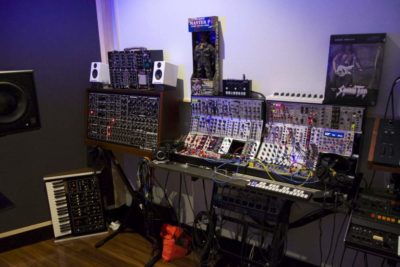


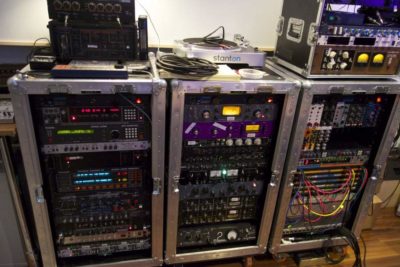
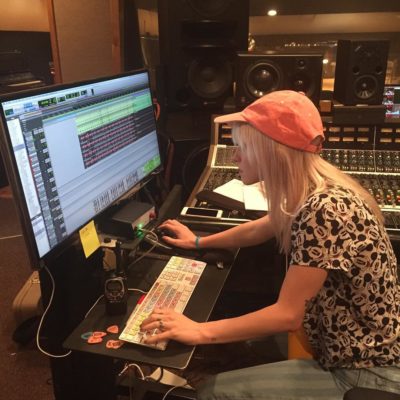
Hector M Jon
August 14, 2016 at 10:29 am (8 years ago)I understand the fact that Justin focuses a lot of his effort on the artistic side. But if he is a professional producer and he makes a living out of it, then I think he does actually care about the business side of it. If it’s a hobby then it’s understandable, but if it’s not, then you really have to care of the financial aspect of it, more importantly if you have a family to take care of, have a home, pay your taxes, have something to eat, etcetera.
Although it would be great to focus only on the artistic side of it, I think in the end if your dedicating your whole life to it, the business side of it is as important as the creative side.